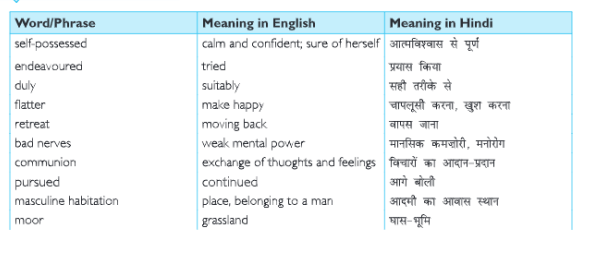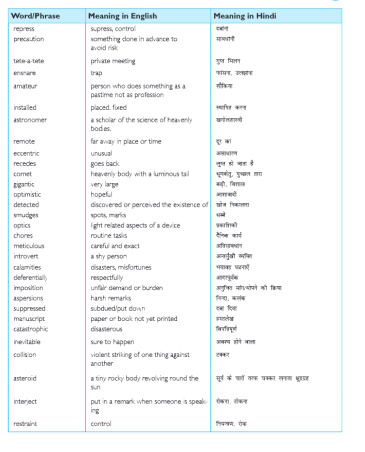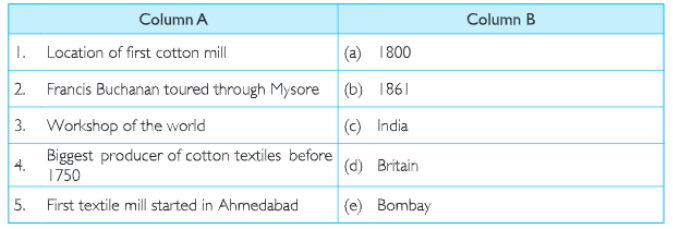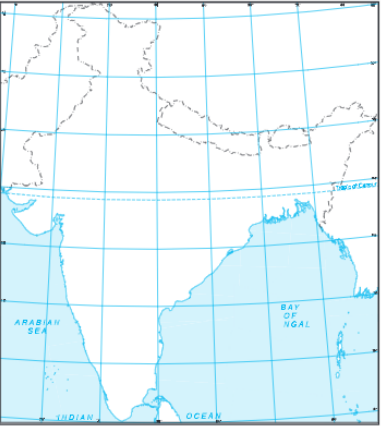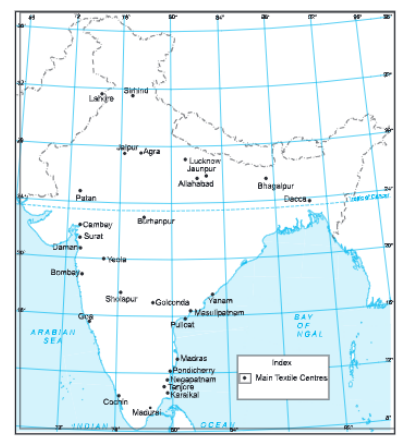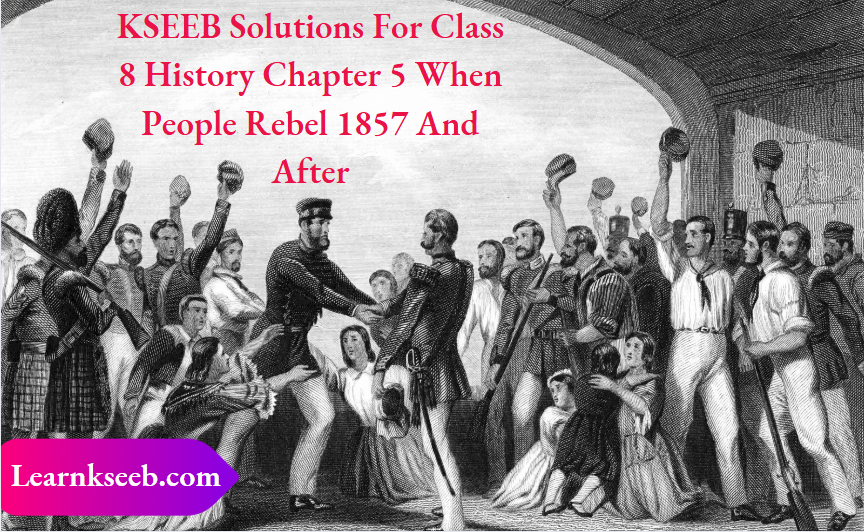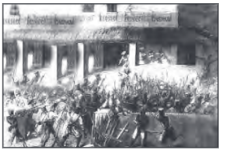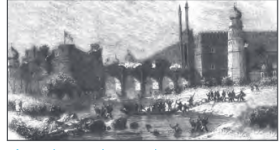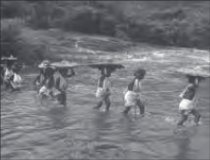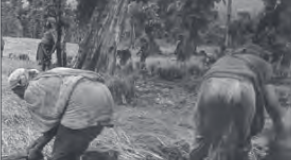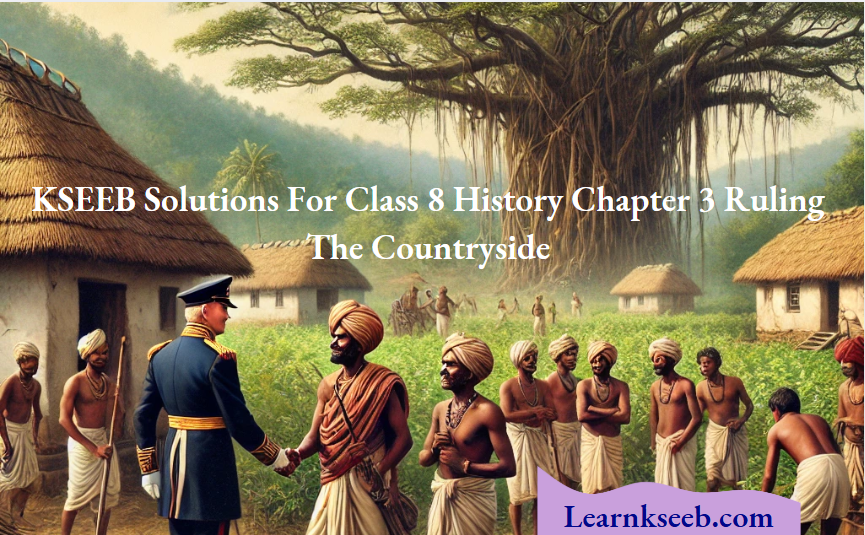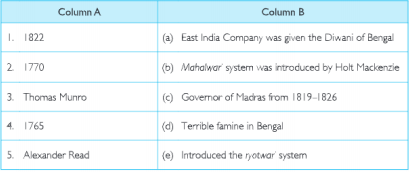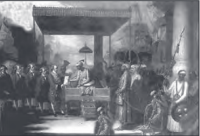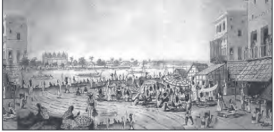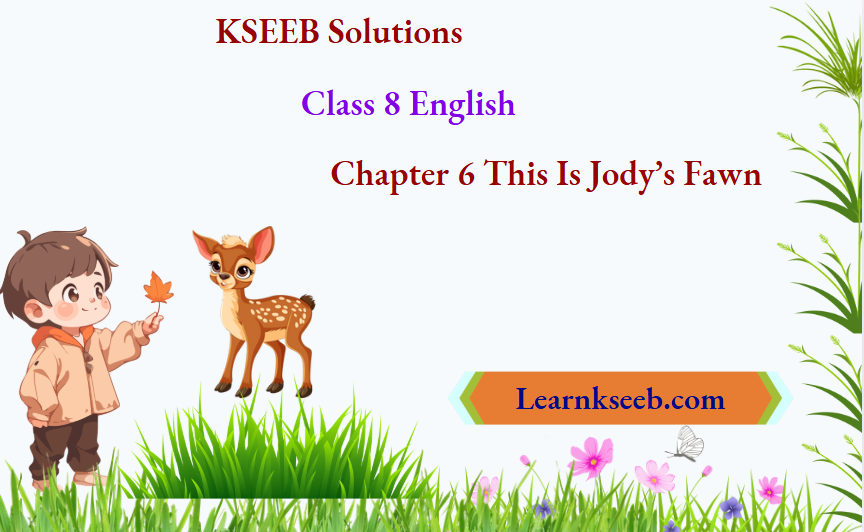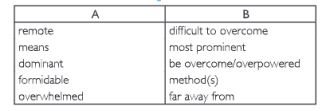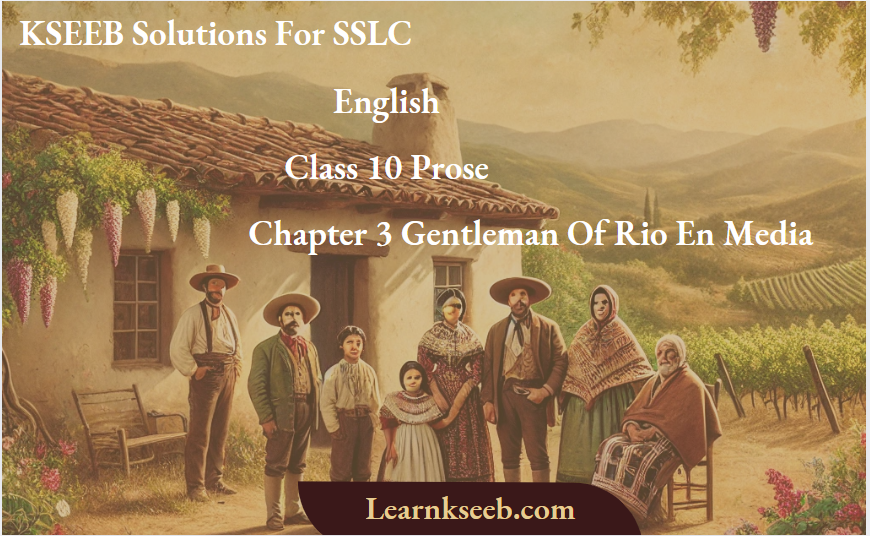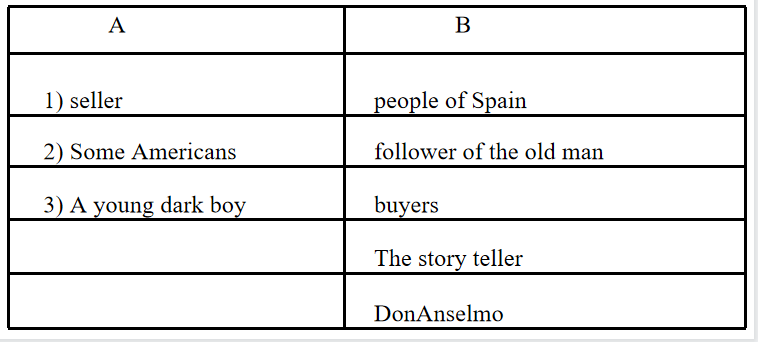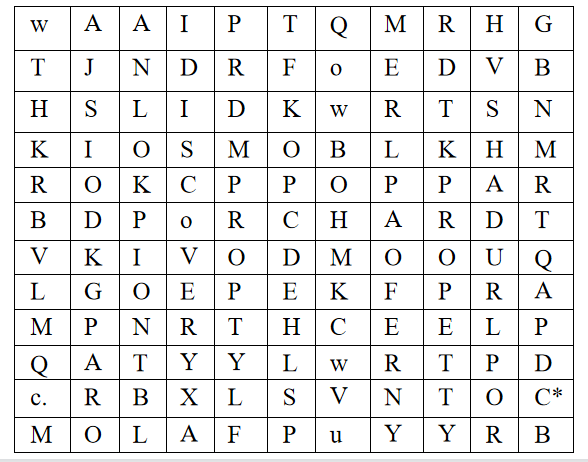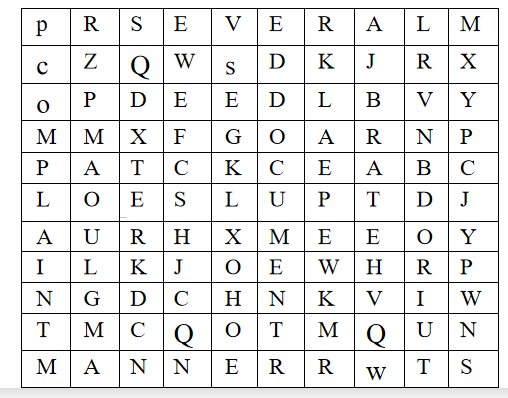KSEEB Solutions For Class 8 English Chapter 4 Bepin Choudhury’s Lapse Of Memory Summary In English
This is a humorous story about a man named Bepin Chaudhury who was made to think that he had completely lost his memory. Here is the story.
Bepin Chaudhury lived all alone and had few friends. He used to read books to pass his time. He was j fond of reading crime stories, ghost stories and thrillers. Every Monday he visited a shop in the New ; Market to buy books. One Monday he found a man looking strangely towards him. He seemed surprised that Bepin Babu had not recognised him.
He reminded Bepin of his Ranchi visit in 1958. He introduced ; himself as Parimal Ghose and said that he was also with him. But Bepin Babu had never been to Ranchi, j He tried to convince Mr Ghose of this, but he would not agree. He told Bepin Bapu many details of his j private life and claimed that he himself had told him all these things. He also narrated some incidents of the journey.
Bepin Babu left the shop and tred to forget all about Mr.Ghose, but to no use. The man seemed to know some intimate details like the bag of books, his wife’s death, his brother’s insanity and so on. But j Bepin was dead sure that he had never visited Ranchi in all his life.
Parimal Ghose had also said that Mr.Dinesh Mukerji was in Ranchi at that time.
Bepin Babu knew him well. So he thought of going to him. But thinking that he had never been his well wisher, he suspended j the idea. The next day in his office, the incident again came to his mind. He rang up Dinesh. To his surprise, Dinesh too, confirmed his visit to Ranchi. In despair, Bepin Babu slammed the receiver and held j his head with his hands.
Bepin Babu had a reputation for being a tireless worker in his firm. But that day he was feeling tired and giddy. He left his office and came home. When he lay in his bed, his servant told him that Chuni Babu wanted to see him. Though Bepin was not in a position to talk to him, he hurried down the stairs.
He j asked him if he remembered something about his trip to Ranchi. Chunilal confirmed the facts in such a j manner that it struck him like a hammer.
Bepin Babu sighed and shook his head. He decide to visit a specialist. Dr.Paresh Chanda After listening ; to his problem, Dr.Chanda said that he must have been to Ranchi but due to some reason the entire ; incident had slipped out of his mind. He suggested Bepin Babu to go to Ranchi once again. The sight of place might remind him of the trip.
Bepin Babu, as suggested by the doctor, undertook a visit to Ranchi. He went from place to place but nothing came to his mind. His head was getting burdened and he felt more sure that he had never been i there. So he fell down unconscious and came to himself only in the evening. When he was discovered by a group of picknickars.
Next morning, Bepin Babu was back home. He was totally hopeless. He realised that he was going to lose his balance of mind. He immediately called Dr.Chanda. Then after a shower, he got into bed. Just then he received a letter from Chunilal. After reading it, he came to understand the entire episode. It; was all planned by Chunilal who wanted to punish him for his unfeeling behaviour.
Now all the tension of Bepin Babu was gone. So when Dr.Chanda came, he invented a funny excuse. He said that he was fine. He had sent for him only for painkiller as his hip was in pain due to a fall in Ranchi.
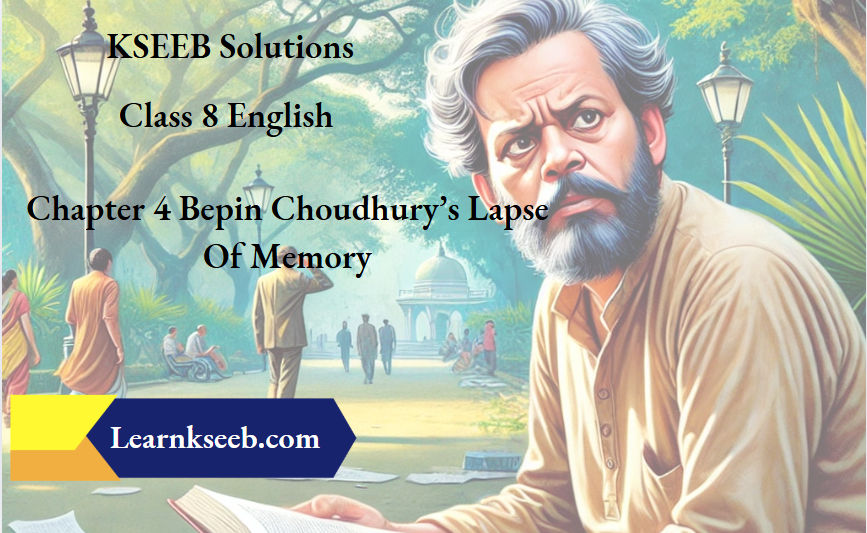
Class 8 English KSEEB Chapter 4 Bepin Choudhury’s Lapse Of Memory Summary
Bepin Choudhury’s Lapse Of Memory Summary In Hindi
यह विपिन चौधरी नामक एक आदमी के बारे में हंसी भरी कहानी है जिसे यह सोचने पर विवश कर दिया गया था कि वह अपनी याददाश्त पूरी तरह खो चुका है। यह रही कहानी, बिपिन चौधरी बिल्कुल अकेला रहता था और इसका कोई मित्र नहीं था। अपना समय गुजारने के लिए वह पुस्तकें पढ़ा करता था। उसे अपराध कथाएं भूतो की कहानियां तथा रोमांचकारी कथाएं पढ़ने का शौक था। हर सोमवार वह न्यू मार्किट में पुस्तकें खरीदने के लिए जाता था। एक दिन उसने देखा कि एक आदमी उसकी ओर अजीब तरीके से देख रहा है। वह इस बात से हैरान दिखाई देता था कि विपिन बाबू ने उसे पहचाना नहीं है। उसने बिपिन को उसके द्वारा 1958 की राँची यात्रा की याद दिलाई। उसने अपना नाम परिमल घोष बताया और कहा कि वह भी साथ था। परंतु विपिन बाबू कभी भी राँधी नहीं गए थे।
उसने मि० घोष को यह बाते समझाने की कोशिश की परंतु वह इसे मानने को तैयार नहीं था। उसने बिपिन को उसके निजि जीव की कई बातें बताई और दावा किया कि यह सब कुछ उसने स्वयं उसे बताया था। उसने यात्रा से जुड़ी कुछ घटनाएं भी बताई। विपिन बाबू दुकान से चला गया और उसने मि० घोष के बारे में सब कुछ भुला देने का प्रयास किया, परंतु सब व्यर्थ उस आदमी को कुछ बहुत ही करीबी बातों का भी पता था, जैसे कि पुस्तकों का थैला, उसकी पत्नी की मौत, उसके घुटने को चोट लगाना इत्यादि। परंतु विपिन को पक्का विश्वास था कि वह जीवन में रांची कभी नहीं गया।
अगले दिन दफ्तर छोड़ अपने घर आ गया। जब वह अपने बिस्तर पर लेटा हुआ था, उसके नौकर ने उसे बताया कि चुन्नीलाल उससे मिलना चाहता है। यद्यपि बिपिन उससे बात करने की स्थिति में नहीं था तो भी वह तेजी से नीचे आ गया। उसने उससे पूछा कि क्या उसे उसके उसकी 58′ में राँची की यात्रा के बारे में कुछ याद है। चुन्नीलाल ने तथ्यों को इस प्रकार मजबूजी दिया कि बिपिन बाबू दिमाग पर एक हथौहा सा लगा। विपिन बाबू को छवि दफ्तर में एक मेहनती कर्मचारी की थी। पर उस दिन वह थकान महसूस कर रहा था और उसे चक्कर आ रहे थे!
बिपिन बाबू ने गहरी सांस ली और अपना सिर झटका। इसलिए उसने डा० चंदा नामक एक विशेषज्ञ से सलाह लौ। उसकी समस्या सुनकर डॉ० चंदा ने कहा कि वह अवश्य की राँची गया होगा, परंतु किसी कारणवश उसके दिमाग से सारी घटना उसके दिमाग से उतर गई होगी। उसने बिपिन बाबू को एक बार फिर राँची जाने का सुझाव दिया हो सकता है कि वहाँ का दृश्य उसे यात्रा दिला है। डॉ० की सलाह के अनुसार विपिन बाबू राँची गया। वह जगह-जगह भटकता रहा, परंतु कुछ भी उसे बाद न आया। उसके दिमाग में वह बात बोझ बनती जा रही थी कि वह वहां कभी नहीं गया।
इसलिए वह बेहोश होकर नीचे गिर गया और उसे शाम को होश आया। जब कुछ पिकनिक मनाने आए लोगों ने उसे देखा! अगली सुबह बिपिन बाबू घर वापिस आ पहुंचा। वह बुरी तरह से निराश था। उसे लगा कि वह दिमाग का संतुलन खो बैठेगा। उसने डॉ० चंदा को बुला भेजा। तब वह स्नान करके विस्तर में चला गया। उसी समय उसे एक चुन्नीलाल का एक पत्र मिला। इसे पढ़ कर उसे सारी कहानी समझ में आ गई। यह सब चुन्नीलाल द्वारा बनाई गई एक योजना थी जो उसे भावनाहीन व्यवहार के लिए दण्ड देना चाहता था। अब विपिन बाबू का सारा तनाव जाता रहा। इसलिए जब डॉ० चंदा आए तो उसने एक विचित्र बहाना बना लिया। उसने कहा कि वह बिल्कुल ठीक है। उसने उन्हें एक दर्दनाशक गोली के लिए बुला भेजा था, क्योंकि राँची में गिर जाने के कारण उसके कूल्हे में दर्द हो रहा थी।
Bepin Choudhury’s Lapse Of Memory Hindi Translation Of The Lesson
Do you have a good memory? Has your memory ever played any tricks on you? Forgetfulness often puts you in a tight spot. But forgetting a part of your life completely may drive you crazy. In this story, Bepin Babu goes nearly crazy because he cannot recollect his stay at Ranchi. He has never been to Ranchi, he insists, though there are many witnesses to the contrary. What is the suspense all about?
क्या आप को स्मरण शक्ति (यादारत) अच्छी है? क्या कभी आपको स्मरण शक्ति में आप के साथ छल किया है? स्मृतिलोप प्रायः तुम्हें कठिनाई की स्थिति में डाल देता है। परन्तु तुम्हारे जीवन के एक भाग (स्मृति) को चूक तुम्हें पूरी तरह भ्रम-वाल में डाल सकती है। इस कहानी में विपिन बाबू लगभग प्रम-जाल में पड़ जाता है, क्योंकि वह रांची में अपने उहराव को याद नहीं कर पाता है। वह आग्रहपूर्वक कहता है कि वह कभी भी रांची नहीं गया है, यद्यपि इसके विपरीत कई गाड़ियां है। इसके संबंध में क्या है?
- Every Monday, on his way back from work. Bepin Choudhury would drop in at Kalicharan’s in New Market to buy books. Crime stories, ghost stories and thrillers. He had to buy at least five at a time to last him through the week. He lived alone, was not a good mixer, had few friends, and didn’t like spending time in idle chat. Today, at Kalicharan’s, Bepin Babu had the feeling that someone was observing him from close quarters. He turned round and found himself looking at a round faced, meek looking man who now broke into a smile.
I don’t suppose you recogiseme” “Have we met before?” asked Bepin Babu.The man looked really surprised. “We met every day for a whole week I arranged for a car to take you to the Hudroo fals. In 1958. In Ranchi My name is Parimal Ghose.” “Ranch?” Now Bepin Babu realised that it was not he but this man who was making a mistake. Bepin Babu had never been to Ranchi. He had been at the point of going several times, but never made it.
He smiled and said, “Do you know who I am?” The man raised his eyebrows, bit his tongue and said, “Do I know you? Who doesn’t know Bepin Choudhury Bepin Babu now turned towards the bookshelves and said, “Still you’re making a mistake. One often dices. I’ve never been to Ranchi” The man now laughed aloud.
प्रत्येक सोमवार को आपने कार्य से लौटते हुए, बिपिन चैधरी पुस्तकें खरीदने के लिए न्यू मार्किट में कालिचरण की दुकान पर जाया करता था। अपराध संबंधी कथाएं प्रेत संबंधी कथाएं तथा रोमांचकारी कथाएं। उसे सप्ताह पर के लिए। एक समय पर कम से कम पांच (पुस्तकें खरीदनी पड़ती थीं। वह अकेला रहता था, मिलनजार नहीं था, उसका कोई मित्र नहीं था और उसे अनावश्यक बातों में समय बिताना पसन्द नहीं था। आज, कालिचरण की दुकान पर नि बाबू को आभास हुआ कि कोई व्यक्ति उसे समीप से ध्यानपवूक देख रहा है। वह घुमा, और अपने आप को एक गोल चेहरे दिखाई देने वाले पुरुष की ओर देखता हुआ पाया, जो अब मुस्कराउन था “मैं नहीं सोचता तुम मुझे पहचानते हो।” “क्या हम पहले कभी मिले है?” विपिन बू ने पूछा। वह व्यक्ति अत्यधिक चकित दिखाई दिया। “हम सप्ताह भर प्रतिदिन मिलते रहे थे। मैंने आपको 1958 में रांची के जलप्रपातों पर ले जाने के लिए कार का प्रबंध किया था। मेरा नाम परिमल है।” “डांची?” अब विपिग बबू को महसूस हुआ कि भूल वह (स्वयं) नहीं बल्कि वह व्यक्ति कर रहा है। विपिन बाबू कभी भी रांची नहीं गया था। वह कई बार जाने ही वाला था, परन्तु वह कमी गया नहीं। वह मुस्काया और बोला, क्या आप जानते है उस व्यक्ति ने अपने भौहें ऊपर चढ़ाई अपनी जीभ काटी, और कहा, “क्या मैं तुम्हें जानता हूँ? “बिपिन चौधरी को कौन नहीं जानता?” लिपित बाबू अब पुस्तकों की अल्मारियों को ओर मुड़ा और बोला, “अभी भी आप चूक रहे हैं। व्यक्ति से प्रायः चूक हो जाती है। मैं कभी भी गंभी नहीं गया।” वह व्यक्ति अब
Word Meanings
- contrary
opposite विपरीत
observing taking notice of ध्यानपूर्वक देख रहा
meek – quiet, humble, forts
lapse of memory slip of memory, पाारत
suspense state of uncertainty, अनिश्चय
close quartersnear place निकट स्थान
thrillers exciting stories, पुलकित करने वाली
कथाएँ2. “What are you saying Mr. Choudhury? You had a fall in Hudroo and cut your right knee. I bought you lndine. I had fixed up a car for you to go to Netarhat the next day, but you couldn’t because of the pain in the knee. Can’t you recall anything? Someone else you know was also in Ranchi at that time. - Mr.Dinesh Mukerji. You stayed in a bungalow. You said you didn’t like hotel food and would prefer to have your meals cooked by a bawarchi. Mr.Mukerji stayed with his sister. You had a big argument about the moon landing, remember? Il tell you more: you always carried a bag with your books in it on your sight-seeing trips. Aml right or both Bepin Babu spoke quietly, his eyes still on the books. “Which month in 58 are you talking about?”.
- The man said “October.” “No .sir”,” said Bepin Babu, Tspent Puja in 58 with afriend in Kanpur, Youre madlinga mistale Good day;” But the man didn’t go, nor did he stop talking *Very strange. One evening I had tea with you in a veranda of your bungalow. You spoke about your family. You said you had no children, and that you had lost your wife ten years ago. Your only brother had died insane, which is why you didn’t want to visit the mental hospital in Ranchi.”
- When Bepin Babu had paid for the books and was leaving the shop, the man was still looking at him in utter disbelief.
- “मि० चौधरी, आप क्या कह रहे हैं? आप हुडरू में गिर गये थे तथा आप का दाहिना घुटना कट गया था। मैं आप. के लिए आपंडीन लाया था। अगले दिन आपको नेत्रहाट (Netarhat) जाने के लिए मैंने कार का प्रबंध किया परंतु आप घुटने में चौदा के कारण नहीं जा सके था। क्या आप कुछ भी याद नहीं कर पा रहे हैं? उस समय रांची में एक और व्यक्ति मि० दिनेश मुकर्जी भी था जिसे आप जानते हैं। आप एक बंगले में ठहरे थे। आप ने कहा था आप होटल का भोजन पसन्द नहीं करते तथा आप एक रसोइये द्वारा तैयार किया गया भोजन अधिक पसन्द करोगे। मि० मुकर्जी अपनी बहन के पास ठहरे हुए थे। पाद है आपने चन्द्रमा पर उतरने के बारे एक बड़ा तर्क दिया था? मैं आपको और अधिक बताऊंगा दशनीय स्थानों की चाशओं में आप सदा अपना पुस्तकों से भरा थैला साथ ले जाते थे। क्या मैं ठीक कह रहा हूँ, या नहीं?” बिपिन बाबू शाना भाव से बोलें, उनकी आंखें अभी भी पुस्तकों पर थीं। “आप 58 के किस महीने के बारे में बात कर रहे हैं?” उस व्यक्ति ने कहा, “अक्टूबर” विपिन बाबू ने कहा, “नहीं श्रीमान्।” मैन ’58 में अपने एक मित्र के साथ कानपुर में ‘पूजा’ में था। आप भूल कर रहे हैं। शुभ दिना” परन्तु वह व्यक्ति नहीं गया, न ही उसने बात करना बन्द किया “बड़ी अजीब (है) एक शाम मैंने आपके बंगले के बरामदे में आपके साथ ली थी। आपने अपने परिवार के बारे में बात की थी। आप ने कहा था, आपके बच्चे नहीं है और यह कि आप दस वर्ष पूर्व अपनी धर्म-पत्नी को खो चुके थे। आपका एक मात्र भाई पागल होकर मर गया था। इसी कारण आप रांची में पागलखाना नहीं देखना चाहते कर दुकान से प्रस्थान करा तब भी यह आदमी उन्हें अत्यधिक हैरानी से देख रहा था। थे..” जब लिपित बाबू ने पुस्तकों के राम चुका
Word Meanings
argument-reasoning
insane not in one’s senses, प्रान्तचित
utter disbelief – complete surprise, पूर्ण अविश्वास
3. Bepin Babu’s car was safely parked in Bertram Street by the Lighthouse Cinema. He told the driver as he got into the car, Just drive by the Gangs, will you, Sitaram” Driving up the Strand Road, Bepin Babu regretted having paid so much attention to the intruder. He had never been to Ranchi no question about it. It was inconceivable that he should forget such an incident which took place only six or seven years ago.
He had an excellent memory. Unless-Bepin Babu’s head reeled. Was he losing his mind? But how could that be? He was working daily in his office. It was a big firm, and he was doing a responsible job. He wasn’t aware of anything ever going seriously wrong. Only today he spoke for half an hour at an important meeting.
And yet… And yet the man knew a great deal about him. How? He even seemed to know some intimate details. The bag of books wife’s death, brother’s Insanity… The only mistaloe was about his having gone to Ranchi Not a mistaioe; a deliberate lie in ’58, during the Pujas, he was in Kanpur at his friend Haridas Bagchi’s place.
All Bepin Babu had to do was write to – no, there was no way of writing to Haridas.Bepin Babu suddenly remembered that Haridas had left with his wife for Japan some weeks ago, and he didn’t have his address. But where was the need for prooff He himself was fully aware that he hadn’t been to Ranchi- and that was that.
The river breeze was bracing and yet a slight discomfort lingered in Bepin Babu’s mind. Around Hastings, Bepin Babu decided to roll up his trousers and take a look at his right knee. There was the mark of an old inch-long cut. It was impossible to tell when the injury had occurred. Had he never had a fall as a boy and cut his knee?
He tried to recall such an incident, but couldn’t. Then Bepin Babu suddenly thought of Dinesh Mukerji. The man had said that Dinesh was in Ranchi at the same time. The best thing surely would be to ask him. He lived quite near in Beni nandian Street. What about gaing right nowt But then if he had really never been to Ranchi,
what would Dinesh think if Bepin Babu asked for a confirmation?
He would probably conclude Bepin Babu was going nuts. No; it would be ridiculous to ask him. And he knew how ruthless Dinesh’s sarcasm could
be.विपिन बाबू की कार लाइट हाऊस सिनेगा के समीप बटीम (Bertram) स्ट्रीट में उसने कार पार्क की गई थी। जैसे ही प्रवेश किया उस ने चालक से कहा, “सौताराम, गंगा के साथ-साथ गाड़ी चलाओ क्या चलाओगे?” स्ट्रैंड रोड पर गाड़ी चलाते समय बिपित बाबू ने उस घुसपैठिये की ओर अधिक ध्यान देने पर खेद जताया वह कभी रांची नहीं इस बारे प्रश्न नहीं (उवता)। यह बात विभिन्न यी कि वह एक ऐसी घटना के बारे में भूल जाये जोकि केवल छ या सात वर्ष पूर्व घटी थी उसकी स्मरणशक्ति बहुत ही देश भी ऐसा न होता तो धन बाबू का सिर चकरा जाता। क्या वह (स्वयं) पागल हो रहा था? परन्तु वह कैसे हो सकता था? वह अपने कार्यालय में प्रतिदिन काम कर रहा था। यह एक बड़ी फर्म श्री तथा वह एक जिम्मेदारी का काम रहा था। उसे ध्यान नहीं था कि कभी कोई अनुचित काम हुआ हो। आते ही का एक महत्वपूर्ण मीटिंग (समा) में आधा घंटा भोता था और फिर भी..और फिर भी वह व्यक्ति उसके बारे में बहुत कुछ जानता था किस प्रकार? वह कुछ व्यक्तिगत की भी जानकारी रखता था। पुस्तकों का थैला, धर्म-पत्नी की मृत्यु भाई का पागलपन..
गलत बात केवल उसके रांची जाने के बारे में थी। यह गलती नहीं एक सोचा-समझा झूठ था 58 में. पूजा (उत्सवों) के दिनों में, वह कानपुर में अपने मित्र हरिदास बची के घर पर पिन] बाबू अब केवल हरिदास को लिखा था- नहीं हरिदास को लिखने का कोई लाभ नहीं था। विपिन बाबू को अचानक याद आया कि हरिदास अपनी पत्नी सहित कुछ सप्ताह पूर्व जापानला गया था और उसके पास उसका पता नहीं था। परन्तु प्रमाण की आवश्यकता कहां थी? वह स्वयं पूरी तरह जानता था कि वह रांची (कभी नहीं गया था और वह सच्चाई थी। नदी की ओर से आने वाली मन्द पव कर देने वाली थी। फिर भी बिपित बाबू के मन में कोसी बेथी। हंदिग्स के आस-पास बिपित बालू ने अपनी पैंट को लपेट कर ऊपर चले तथा अपने दाहिने घुटने को एक नकर देखने का निश्चय किया। वहाँ एक इंच भर लम्बा कठे का.
निशान था। वह कहना मुश्किल था कि दुर्घटना कब हुई थी। क्या वह बचपन में कभी गिर कर अपना घुटना पावल नहीं कर बेठा था? उसने ऐसी कोई घटना याद करने की कोशिश की पर नहीं कर सका। तब भिगिनू को अचानक दिनेश मुखर्जी का विचार आया उस व्यक्ति ने कहा था कि दिनेश उस समय रांची में था। सबसे अच्छी बात निश्चित रूप से यह थी कि उससे पूछा जाये। यह बिल्कुल निकट street में रहता था। ठीक अभी उसके पास जाना कैसा रहेगा? परंतु तंब, यदि वह वास्तव में कभी गंभी नहीं गया होगा, तो दिनेश क्या सोचेगा यदि विपिन बाबू द्वारा उससे पुष्टि के लिए पूछा जाता है? वह सम्भवतः इस निष्कर्ष पर पहुंचेगा कि विपिन बाबू पागल हो गया है। नहीं, उसे पूछना कर होगा और यह जानता था दिनेश का कूर हो सकता है। कितना
Word Meanings
- intruder one who comes uninvited, भिरा बुलाए
आने वाला सा
inconceivable that cannot be imagined,
अकल्पनीय
head reeled-was shocked and confused,
हो गया हो गया
losing his mind becoming mad, मानसिक सनुत्तन
deliberate well considered, सोचा-समझा,
bracing-cold but stimulating, शीतल परन्तु
प्रोत्साहित करने वाली
lingered stayed for a long time, देर तक ठहरा
रहा
ridiculous senseless, अजीब
ruthless-cruel, fra
intimate very personal and private अन्तरंग निजी
sarcasm ronical remarik आक्षेप, ग्
4. Sipping a cold drink in his air-conditioned living room. Bepin Babu felt at ease again. Such a nuisance! Just because they have nothing else to do they go about getting into other people’s hair. After dinner, snuggling in bed with one of the new thrillers.
Bepin Babu forgot all about the man in New Mariet. Next day, in the office, Bepin Babu noticed that with every passing hour, the previous day’s encounter was occupying more and more of his mind. If the man knew so much about Bepin Babu,
how could he make such a mistake about the Ranchi trip?
Just before lunch Bepin Babu decided to ring up Dinesh Mukerji. It was better to settle the question over the phone; at least the embarrassment on his face wouldn’t show. Two-Three-Five-Six-One-Six Bepin Babu dialled the number. Hallo,” “s that Dinesh! This is Bepin here”. “Well, well-what’s the news?” just wanted to find out if you recalled an incident which took place in “58” 58? What incident?”. “Were you in Calcutta right through that year? That’s the first thing The got to lnow” “Wait just a minute … 58… just let me chedc in my diary” For a minute there was silence. Bepin Babu could feel that his heartbeat had gone up. He was siveating a little. “Hala” “Yes’ “fve got it.
I’d been cut trice” “Where” to Krishnanagar to a nephew’s wedding And then… but you’d know about this one. The trip to Ranchi You were there too. That’s al, But what’s all this sleuthing “Once in February – nearby about” “No. I just wanted to – anyway, than is.” Bepin Babu slammed the receiver down and gripped his head with his hands. He felt his head swimming.
A chill seemed to spread over his body. There were sandwiches in his tiffin bax, but he didn’t eat them. He had lost his appetite.
अपने वातानुकूलित कक्ष में शीतल पेय की चुसकियां लेते हुए बिपिन बाबू पुनः शान्त मन हो गया। ऐसा उत्पात केवल इस कारण से कि उनके उस और कुछ करने को नहीं होता, वे दूसरे लोगों के मामलों में टांग अढ़ाने का काम करते हैं। रात के भोजन के बाद रोमांचक कथाओं की पुस्तकों में से एक को लेकर बिस्तार में लेटे हुए विपिन बबून्यू के बारे में सब कुछ गुला अगले दिन कार्यालय में विपिन बाबू को महसूस हुआ कि बीतने वाले हर घण्टे के साथ बीते दिन की मुलाकात उसके मन में अधिक से अधिक मजबूत होती जा रहो है। यदि वह आदमी मिपिन बाबू के बारे इतना अधिक जानता था, तो यह रांची की यात्रा के बारे में ऐसी मूल कैसे? लांच (दोपहर का भोजन) से थोड़ा पहले विपिन बाबू ने दिनेश मुकर्जी को फोन करने का निर्णय किया फोन पर इस प्रश्न को सुलझाना अधिक छा था कम से कम उसके चेहरे पर परेशानी से प्रकट नहीं होगी। दो-तीन-पांच-छ:-एक-छः। विपिन बाबू ने तम्बर मत किया। “क्या दिनेश है? मैं मन हूँ।” ‘अच्छा, अच्छा-क्य समाचार है?” “मैं केवल यह जानना चाहता था कि क्या तुम्हें कोई घटना याद है जो ’58 में घटी थी। “58? कौन सी घटना” “क्या उस वर्ष सारा खाल तुम कोलकाता में थे? यह पहली बात है जो मुझे जानती है।” “एक मिनर प्रतीक्षा करो.. 58…मुझे खरा अपनी डावरी चैक कर लेने दो।” एक मिनट के लिए खादेशी रही विपिन बानू को लग रहा था कि उसके दिल की धड़कन बढ़ गई है। उसे थोड़ा आ रहा था। “हैलो।” मुझे मिल गई है। मैं बाहर” “एक बार फरवरी में निकट ही मानने की शादी पर कृष्ण नगर और फिर परंतु इसके बारे में तुम जानते हों। रांची की यात्रा तुम भी वहां थे बस परंतु यह सारी किस बारे में है?” “नहीं। मैं बस यही जानना चाहता था फिर भी धन्यवाद। ” विपिन बालू ने रिसीवर नीचे पटक दिया और अपना सिर अपने हाथों से जकड़ लिया। उसे अपना सिर चकराता हुआ उसके शरीर में एक पौड़ गई। उसके टिफिन बॉरंतुसने उन्हें हुआ नहीं खाया। उसको भूख पर चुकी थी।
Word Meanings
- |muisance annoying actions, उत्पात
encounter-meet with conflict, मुठभेड़ मुकावता
slammed shut with a loud noise देख आबाद के
साथ पटका
snugding lying close, सट कर लेटा हुआ
sleuthing – investigating (onervent), (किसी
5. After lunch-time, Bepin Babu realised that he couldn’t possibly carry on sitting at his desk and working This had never happened in the tiventy-five years he had been with the firm.
He had a reputation for being a tireless, conscientious worker. But today his head was in a whirl Back home at two-thirty, Bepin Babu lay down in bed and tried to gather his wits together. He knev that it was possible to lose one’s memory through an injury in the head, but he didn’t know of a single instance of someone remembering everything except one particular incident and a fairly recent and significant one at that.
He had aliveys wanted to go to Ranchi to have gone there, done things and not to remember was something utterly impossible. At seven thirty, Bepin Babul’s servant came and announced, “Chuni Babu, sr. Says k’s very important” Bepin Babu knew what Chuni had come for. Chunilal had been at school with him.
He’d been having a rough time lately and had been coming to see him about a job. Bepin Babu knew it was not possible to do anything for him and in fact, told him so. But Chuni liept tuming up like a bad penny. Bepin Babu sent word that not only was it not possible for him to see Chuni now, but not in several weeks.
But as soon as the servant stepped out of the room, it struck Bepin Babu that Chuni might remember something about the ’58 trip. There was no harm in asking him. Bepin Babu hurried down the stairs and into the living room. Churi was about to leave, but seeing Bepin Babu appear, he turned round hopefully. Bepin Babu didn’t beat about the bush
लंच-काल के बाद, विपिन बाबू ने महसूस किया कि संभवत वह अपने डेस्क पर बैठ कर काम जारी नहीं रख सकता। फर्म के में काम करते हुए पच्चीस वर्ष तक उसके साथ ऐसा कभी नहीं हुआ। वह एक अथक, ईमानदार कार्यकर्ता के रूप में जाना जाता था। परंतु आज उसका सिर चकरा रहा था।
अढाई बजे घर वापसी पर बिपिन बाबू बिस्तर पर लेट गया तथा शान्त होकर पिछली बातें मार करने का प्रयत्न करने लगा। वह जानता था कि सिर में लगने वाली चोट से मनुष्य को स्मरण शक्ति का खो जाना है, परंतु वह एक भी ऐसा उदाहरण नहीं जानता था कि व्यक्ति को किसी विशिष्ट घटना के अतिरिका शेष सभी बातें याद हो-और- वह भी एक बिल्कुल बता और महत्वपूर्ण घटना। वह सदा रांची जाने की इच्छा रखता था, वह वहां गया हो, कुछ किया हो, उन्हें पतासम्भव बात थो
साढ़े सात बजे, विपिन बाबू का सेबक आया और बोला, “Chuni babu, श्रीमान् कहता है अति आवश्यक काम है।”
विपिन बाबू जानता था Chuni किस लिए आया है। Churi Lal (लाल) उसके साथ स्कूल में रहा था। थोड़े दिनों से यह कठिन समय से गुजर रहा था तथा किसी छोट-पोटेषय में उससे मिलने आता रहता था। विपिन बाबू जानता था कि उसके लिए कुछ कर पाना नहीं है, और वास्तव में उसने उसे ऐसा बता भी दिया। था। परंतु Churi खोटे सिक्के की तरह आता रहता था। विपिन बाबू ने सन्देश भेजा कि न केवल उसके लिए इस समय Churi से मिलना है, बल्कि कई सप्ताहों तक भी नहीं। परंतु ज्यों ही सेवक ने कमरे से बाहर कदम रखा, विपिन बाबू को विचार आपा कि चूनी को शायद 58 की यात्रा के बारे में कुछ बाद हो उससे पूछने में कोई हानि नहीं है। विपिन बाबू जल्दी से सीढ़ियों से उतरा और कमरे में पहुंच गया। चूनी जाने ही वाला था, परंतु विपिन बाबू को देखकर, वह आतापूर्वक घूमा विपिन बाबू ने इधर-उधर की व्यर्थ बात नहीं की।
Word Meanings
- conscientious- careful and correct, शुद्ध
मति वा
gather his wits maike an effort to calm down
शान्त हो कर सोच-विचार
recently-not long ago थोड़े दिन हुए
having a rough time-having a lot of
6 . “Listen, Chuni-I want to ask you something You have a good memory, and you’ve been seeing me off and on for a long time. Just throw your mind back and tell me – did I go to Ranchi in ’58” Chuni said, “58P It must have been 58. Or was it ’59? “Your’re sure that I did go to Ranchi?” Chuni’s look of amazement was not unmixed with worry, “Do you mean you have doubts about having gone at all?” “Dill go! Do you remember clearlyph Chuni sat down on the sofa, fixed Bepin Babu with a long, hard stare and said, “Bepin, have you taken to drugs or something? As far as I know, you had a dean record where such things were concerned.
I know that old friendships don’t mean much to you, but at least you had a good memory. You can’t really mean that you’ve forgotten about the Ranchi trip Bepin Babu had to turn away from Chuni’s incredulous stare “Do you remember what my last job wasth asled Chunilal “Of course.
You worled in a travel agency;” “You remember that and you don’t remember that it was I who foxed up your railway booking for Ranch? I went to the station to see you off one of the fans in your compartment was not working got an electrician to fix it Have you forgotten everything! Whatever is the matter with your You don’t look too well, you know.
“Bepin Babu sighed and shook his head “I’ve been working too hand” he said at last. “That must be the reason, Must see about consulting a specialist” Doubtless it was Bapin’s condition which made Chunilal leave without mentioning anything about a job”
सुना चुनी में तुम से कुछ पूछना चाहता हूं। तुम्हारी स्मरण शक्ति अच्छी है और तुम लम्बे समय से मुझे प्रायः
मिलाते रहे हो। बारा याद करके बताओ क्या मैं 58 में रांची गया था।” चूनी ने कहा, “587 यह 58 हो रहा होगा। यह 39 था।” चूनी को हैरान नहरें चिन्तयुक्त थीं। “क्या आपका यह अर्थ है कि आपको इस विषय में सन्देह है “क्या मैं गया था? क्या तुम्हें स्पष्ट रूप से याद है नशेचुनी सोफे पर बैठ गया, देर तक कठोर नजारों से विपिन बाबू देखता रहा। उसने का, “विपिन, क्या तुमने की दवाइया) या और कुछ लेने की आदत डाल ली है? मेरे विचार में जहां तक ऐसी चीटों का सम्बन्ध है, आपका रिकार्ड साफ़ है। मैं जानता हूं कि पुरानी मित्रता तुम्हारे लिए अधिक अर्थ नहीं रखती, परंतु कम-से-कम तुम्हारी स्मरण शक्ति अच्छी है तुम्हारा वास्तव में यह अर्थ नहीं हो सकता कि तुम रांची की यात्रा के बारे में भूल गये हो?”
विपिन बाबू से छूनी की शंका-युक्त टकटकी से आंखें ह “क्या तुम्हें याद है मेरा अन्तिम काम क्या था?” चुनी लाल ने पूछा “बिल्कुल तुम एक ट्रैक्स एजेंट का काम करते थे।” “आपको यह (तो) याद है और आपको यह याद नहीं कि वह मैं हो या जिसने आपका रोची के लिए रेलवे बुकिंग का प्रबन्ध किया था? मैं तुम्हें स्टेशन पर विदा करने गया था; आपकेट (डिब्बे) में एक पंखा नहीं चल रहा था मैं इसे ठीक करने के लिए इलक्ट्रीशियन को लाया था। क्या आप सब कुछ भूल गये हो? आपके साथ क्या है? दिखाई नहीं देते हैं।
विमिन बाबू ने लम्बी सांस ली और अपना सिर झटका “मैं बहुत अधिक परिश्रम करता रहा हूँ.” उसने अन्त में कहा। “अवश्य हो यही कारण रहा होगा। मुझे अवश्य किसी विशेषज्ञ से सलाह लेनी होगी।” निःसन्देह विपिन की हालत ही ऐसी थी जिसने चूनी लान को किसी काम-धन्धे के बारे में कहे बिना ही वहां से जाने को विवश कर दिया।
Word Meanings
- off and on now and then प्राय:
taken to drugs-started using drugs (पशीली)
दवाइयां खाना
amazement
incredulous
श्वसनीय
astonistment, आश्चर्य
unbelievable शंका युक्त,
specialist – one who devotes oneself to a
special branch of inowledge, षष
7. Paresh Chanda was a young physician with a pair of bright eyes and a sharp nose. He became thoughtful when he heard about Bepin Babu’s symptoms, Look Dr Chanda” said Bepin Babu desperately, “You must cure me of this horrible illness. I can’t tell you how it’s affecting my work” Dr.Chanda shook his head. Youlknow what, Mr Choudhury;” he said, “The never had to deal with a case such as yours Franily, this is quite outside my field of experience. But I have one suggestion.
I don’t know if itll work, but it’s worth a try. It can do no harm Bepin Babu leaned forward anxiously. “As far as | can make out,” said Dr Chanda, “And I think youre of the same opinion you must have been to Ranch, but due to some unli known reason, the entire episode has slipped out of your mind.
What I suggest is that you go to Ranchi once again. The sight of the place may remind you of your trip. This is not impossible. More than that I cannot do at the moment. I’m prescribing a nerve tonic and a tranquilliser. Sleep is essential, or the symptoms will get more pronounced” Bepin Babu felt somewhat better the next morning After breakfast, he rang up his office, gave some instructions and then procured a first class ticket for Ranchi for the same evening.
परेश चन्दा तीखे नयन नक्श बाला एक नवयुवक डाक्टर था। जब उसने मिपिन बाबू के होग-लक्षणों के बारे में सुना तो वह सोच में पड़ गया। विपिन बाबू ने निराशापूर्वक कहा, “देखिये डॉ० पदा, आपको मुझे इस भयानक बीमारी से मुक्ति दिलानी है। मैं आपको बता नहीं सकता कि यह किस प्रकार मेरे काम को प्रभावित कर रही है।” उसने कहा, “मि० चौधरी आप जानते है कि आपको क्या बीमारी है। इस प्रकार की अवस्था से जैसी आपकी है, मुझे कभी भी बास्ता नहीं पड़ा है। साफ बात तो यह है कि यह मेरे अनुभव के क्षेत्र से बिल्कुल बाहर है। परंतु मेरा एक सुझाव है। मैं नहीं जानता यह प्रभावशाली होगा परंतु इसे आसमान में कोई हर्ज नहीं है। इससे कोई हानि नहीं विपिन बाबू कापूर्वक आने का
डॉ पन्या ने कहा, “जहां तक में समझ सकता हूं और मेरा विचार है आपका भी यही मत है आप अवश्य रांची गये होंगे, परंतु किसी अज्ञात कारण से, यह सारा प्रसंग आपके दिमाग से खिसक गया है। मैं जो सुझाव देता हूं वह यह है कि आप एक बार पुनः रांची जाइये उसे स्थान को देखने से आपको आपकी यात्रा पर आ सकती है। वह असम्भव नहीं है। इससे अधिक इस समय मैं कुछ नहीं कर सकता। मैं रसों के लिए बलवर्धक औषधि तथा शान्त करने वाली औषधि के उपयोग की सलाह देता आवश्यक है अन्यथा रोग के लक्षण अधिक उम्र हो जाएंगे।”अगली प्रातः बिपित बालू से कुछ अच्छा अनुभव किया। नापते के बाद उसने अपने कार्यालय में फोन किया, कुछ निर्देश दिये और तब उसी शाम का रांची के लिए एक प्रथम श्रेणी का टिकट से लिया
Word Meanings
- episode – an incidentali narrative, प्रसंग
to prescribe to advise use of a medicine,
औषधि के उपयोग की सलाह देना
procured-got (with a little difficulty), ref
किया
8. Getting off the train at Ranchi next morning, he realised at once that he had never been there before. He came out of the station, took a taxi and drove around the town for a while. He realised that the streets, the buildings, the hotels, the bazaars, the Morabadi Hill with none of these had he the slightest acquaintance.
Would a trip to the Hudroo Falls help? He didn’t believe so, but, at the same time, he didn’t wish to leave with the feeling that he hadn’t tried enough. So he arranged for a car and left for Hudroo in the afternoon. At five o’clock the same afternoon in Hudroo, two Gujarati gentlemen from a group of picnickers discovered Bepin Babu lying unconscious beside a boulder. When he came round, the first thing Bepin Babu said was, Tm finished.
There’s no hope left.” Next moming, Bepin Babu was back in Calcutta. He realised that there was truly no hope for him. Soon he would lose everything his will to work, his confidence, his ability, his balance of mind. Was he going to end up in the asylum at Bepin Babu couldn’t think any more. Back home, he rangup Dr Chanda and asked him to come over. Then after a shower, he got into bed with an ice bag clamped on his head, just then the servant brought him a letter which someone had left in the letter box. A greenish envelope with his name in red ink on it.
Above the name it said “Urgent and Confidential. In spite of his condition, Bepin Babu had a feeling that he ought to go through the letter. He tore open the envelope and took out the letter. This is what he read Dear Ben I had no idea that affuence would bring about the end of change in you that it has done. Was it so cut for you to You ant an old frirend down on ha lud I have no money, so resources are instand What I have is “magination, a part of which/used in retribution of your unfoeing behaviour. Well, you all be all right again now. A novel The withen is being considered by a publisher: If he lives it enough until see me through the next few months Yours Chunilal
अगली प्रातः रांची में गाड़ी से उतरते हुए उसने तुरंत अनुभव किया कि वह वहां पहले कभी नहीं आया था। वह स्टेशन से बाहर आया, टैक्सी सी और थोड़े समय के लिए नगर के चारों ओर घुमा। उसने अनुभव किया कि ये गर्गन, वे होटल, वे बखार, वह मोराबादी हिल-इनमें से किसी के साथ भी उसका चरा सा भी परिचय नहीं है। इस प्रपातों की यात्रा कुछ सहायता करेगी? उसे ऐसा नहीं था. परंतु फिर भी उसने कार का प्रबन्ध किया और दोपहर बाद हुदन के लिए चला गया। हुखरु में उसी दोपहर पांच बजे, पिकनिक मनाने वाले एक ग्रुप में से दो गुजराती भद्र पुरुषों ने विपिन बाबू को एक बोल्डर (गोल पत्थर के समीप होता पड़े हुए पाया। जब वह होश में आप पहली बात जोति बाबू ने कही, यह थी, “ही समाप्त (बरबाद हो गया हूँ। अब कोई आशा नहीं बची है।” आने वाली प्रात: मिपिन बाबू वापिस कलकत्ता में था। उसने अनुभव किया कि सचमुच उसके लिए कोई आशा नहीं है। शीघ्र ही यह सब कुछ खो बैठेगा काम करने की उसकी इच्छा, उसका विश्वास उसकी योग्यता उसकामातुन वह मरोग पालखाने में जा रहा है? बिपित बाबू और नहीं सोच पाया। घर वापसी पर उसने डॉ० चन्दा को फोन किया और उसे आगे के लिए प्रार्थना की। तब, फुलारा स्नान के बाद एक बर्फ की थैली आपने सिर पर रखे वह बिस्तर में घुस गया। उसी समय व उसके लिए एक पत्र लाया जोकि कोई व्यक्ति लेटरबॉक्स में छोड़ गया था। हल्के हरे रंग का एक लिफाफा, उसपर लाल स्याही से लिखा उसके नाम था। नाम से ऊपर उस पर लिखा पर मी, विपिन बालू के मन को मानना थी कि उसे इस पत्र को पड़ना चाहिए। उसने लिखा था- प्रिय विपिन, था, ‘आवश्यक एवं गुणा’। ऐसी अवस्था होने
मेरा बिल्कुल भी ऐसा विचार नहीं था कि समृद्धि आप में हर प्रकार का परिवर्तन ला देगी जैसा कि इस ने किया है। क्या आपके लिए अपने एक पुराने मित्र जिसका पहन की ओर मा की सहायता करना इतना कठिन था? मेरे पास धन नहीं मेरे संसाधन सीमित हैं। मेरे पास जो कुछ है वह कल्पना शक्ति है, जिसका एक हिस्सा मैंने आपके भावना-हीन व्यवहार का बदला लेने के लिए लगा दिया है।
और, आब आप पुनः स्वस्थ हो जाओगे एक उपन्यास कि मैंने लिखा है, एक प्रकाशक के विचाराधीन है। यदि उसे यह काफी पसन्द आ गया, तो यह मेरे लिए आने वाले कुछ महीनों में सहायक सिद्ध होगा। आपका चुन्नील
Word Meanings
- acquaintanc farmilarity परिचय
asylum a place for mad people, पागलखाना
unconscious-not conscious, अचेत
confidential secret गुप्त
9. When Dr Chanda came, Bepin Babu saikl, m fine, it all came back as soon as I got off the train at Ranchi” “A unique case,” said Dr Chanda. “I shall certainly write about t in a medical journal” “The reason why I sent for you” said Bepin Babul is that I have a pain in the hip from a fall I had in Ranchi. If you could prescribe a painkiler….
जब डाक्टर चन्दा आया, विपिन बाबू ने कहा, “मैं पूरी तरह स्वस्थ हूँ। मुझे सब कुछ याद आ गया तथा जब मैं रांची में ट्रेन से उतरा था”
“एक अनूठा केस.” डाक्टर चन्दा ने कहा, “में ही इस विषय में मैडीकल जर्नल में लिखूंगा।” “मैंने आपको इसलिए बुलाया है क्योंकि रांची में गिर जाने के जाने के कारण मेरे कुल्हे में दर्द है। कृपया मुझे कोई दनाशक दवाई लिख रोजिए..”पित ने कहा
KSEEB Class 8 English Reader Solutions For Bepin Choudhury’s Lapse Of Memory
Comprehension Check-1
Question 1. Why did the man stare at Bepin Babu in disbelief?
Answer. The man reminded Bepin Babu of his trip to Ranchi again and again. But Bepin Babu denied having ever gone there. This made the man stare at Bepin Babu in disbelief
Question 2. Where did Bepin Babu say he went in October ’58?
Answer. Bepin Babu said that he had gone to Kanpur in October 58. He stayed at his friend Haridas Bagchis place.
Question 3. Mention any three (or more) things that Parimal Ghose knew about Bepin Babu
Answer. Parimal Ghose knew a great deal about Bepin Babu. He even seemed to know intimate details about him. He knew that Bepin Babu had no children his wife died ten years ago his brother had died insane that was why he did not visit the mental hospital in Ranchi and he did not like hotel food.
Comprehension Check-2
Question 1. Why did Bepin Babu worry about what Parinal Ghose had said?
Answer. Bepin Babu was worried about the fact that Parimal Ghose knew a great deal about him. He seemed to know even intimate details. His wife’s death, his brother’s insanity, etc. Yet Bepin was sure he had never been to Ranchi.
Question 2. How did he try to decide who was right—his memory or Parimal Ghose?
Answer. For this Bepin Babj dec ded to ring up Dinesh Mukherji.
Why did Bepin Babu hesitate to visit Mr Mukerji?
Question 3. Why did he finally decide to phone him?
Answer. Bepin Babu hesitated to visit Mr Mukerji because he wanted to avoid embarrassment. Moreover, he thought that Mr. Mukerji might assume :hat. he had lost his wits. But he had no other opt on to confirm what Mr.Ghose was saying. At last he decided to call Mr. Mukerji to avoid talking to him face to face.
Question 4.What did Mr Mukerji say? Did it comfort Bepin Babu, or add to his worries?
Answer. Mr Mukerji. after checking his diary, said that he visited Ranchi in October ’58. He also added that he {Bepin Babu) was also there. It added to Bepin Babu’s worries.
Comprehension Check-3
Question 1. Who was Chunilal? What did he want from Bepin Babu?
Answer. Chunilal was an old friend of Bepin Babu. He was having a rough time. He wanted Bepin Babu to help him find a job.
Question 2. Why was Dr Chanda puzzled? What was unusual about Bepin Babu’s loss of memory?
Answer. Dr Chanda was puzzled when he heard the symptoms of Bepin Babu’s ailment The unusual thing was that he remembered every evert of his life except one episode-his visit to Ranchi. If he had lost his memory’, he would have for gotten all events of his life.
Comprehension Check-4
Question 1. Had Bepin Babu really lost his memory and forgotten all about his trip to Ranchi?
Answer. No, Bepin Babu was not a victim of memory loss. He was charging his office duties efficiently. In fact it was a trick played by his old friend, Chunilal. Bepin was quite sure that he had never been to Ranchi. But he was caught in the trao laid by Chunilal.
Question 2. Why do you think Chunilal did what he did? Chunilal says he has no money. What is it that he does have?
Answer. Chunilal did so to teach Bepin Babu a lesson for not helping him in his hard time. Chunilal has no money but he has imagination which he uses as a punishment for Bepin Babu’s unfeeling behaviour
Bepin Choudhury’s Lapse Of Memory Working With the text
Question 1. The author describes Bepin Babu as a serious and hardworking man.What evidence can you find in the story to support this?
Answer. Bepin Babu had been working in a big firm for twenty five year’s. He never got negative remarks during this period. He was an efficient arid tireless worker. This is a clear evidence that Bepin Babu was a serious and hard working man.
Question 2. Why did Bepin Babu change his mind about meeting Chunilal? What was the result of this meeting?
Answer. Bepin Babu did so because he thought that Chunilal might remember about the ’58 trip-the trip to Ranchi. What Chunilal told him about his trip made him more miserable. Chunilal told him that he had fixed up his railway booking for Ranchi. He also had gone to the station to see him off and helped him with the non-functional fan in his compartment. He, therefore, decided to consult a physician to cure him of his problem.
Question 3. Bepin Babu lost consciousness at Hudroo Falls.What do you think was the reason for this?
Answer. Bepin Babu was under great stress thinking “.hat he had lost his memory. Thus, he was undergoing severe mental agony. The journey by train to Ranchi, taking round of the city in a taxi and then to Hudroo Falls fatigued him. Hence due to fatigue and mental agony, Bepin Babu lost his consciousness at Hudroo Falls.
Question 4. How do you think Bepin Babu reacted when he found out that Chunilal had tricked him?
Answer. Bepin Babu must have felt ashamed of himself for being a self centred man. At the same time, he must have found a great relief from the stress he was undergoing.
Bepin Choudhury’s Lapse Of Memory Class 8 KSEEB Questions And Answers
Bepin Choudhury’s Lapse Of Memory Working With Language
1. Look at these two sentences.
He had to buy at least five books to last him through the week
BePin had to ask Chuni to leave.
Had to is used to show that it was very important or necessary for Bepiri Babu to do something. He had no choice. We can also use ‘have to’/’has to‘ in the same way.
Fill in the blanks below using‘ had to’/‘have to7‘has to’.
- I____ cut my hair every’ month.
- We___ go for swimming lessons last year.
- She___ tell the principal the truth.
- They’____ take the baby to the doctor.
- We_____ complain to the police about the noise.
- Romit ____finish his homework before he could come out to play.
- I____ repair my cycle yesterday.
Answer.
- have to
- had to
- has to
- had to
- have to
- had to
- had to
2. Here are a few idioms that you will find in the story. Look for them in the dictionary in the following way.
First, arrange them in the order in which you would find them in a dictionary. (Clue: An idiom is usually listed under the first noun, verb, adjective or adverb in it Ignore articles or prepositions in the idiom). (To help you, we have put in bold the word under which you must look for the idiom in the dictionary’).
- at/from close quarters (close: adjective)
- break into a smile (break: verb; look
- under ‘break into
- carry on (carry: verb)
- have a clean record (you may find related meanings under both These words)
beat about the bush (verb)
Now refer to your dictionary and find out what they mean.
Answer.
- Beat about the bush – not to say something exactly/to talk irrelevantly
- (Break into a smile – smile abruptly
- Carry on – to continue
- Have a clean record – to have a good reputation
- At/from close quarters – very near/from nearby
3.Study the sentences in the columns below.

Compare the sentences in the two columns, especially the verb forms. Answer’ the following questions about each pair of sentences.
1)Which column tells us that Bepin Babu is still woridnig at the same place?
2)Which column suggests that Chunilalis now waiting for a reply from the publisher?
3)Which column suggests that the person still remembers the movie he saw?
4)Which column suggests that the experience of visiting Ranchi is still fresh in the speaker’s mind?
Answer. (1) B, (2) B, (3) B, (4) A
4. Given below are jumbled sentences. Working in groups, rearrange the words in each sentence to form correct sentences.
You will find that each sentence contains an idiomatic expression that you have come across in the lesson. Underline the idiom and write down its meaning. Then use your dictionary to check the meaning. One sentence has been worked out for you as an example.
Jumbled sentence: vanished/The car/seemed to/into thin/have/air.
Answer. The car seemed to have vanished into thin air
Idiom: vanished into thin air, disappeared or vanished in a mysterious way.
(1)stop/and tell me/beating about/what you want/the bush
Answer. Stop beating about the bush and tell me what you want
Idiom: _____ beat about the bush- to talk irrelevantly
(2)don’t pay/if you/attention/you m ght/the wrong train/to the announcement/board
Answer. If you don’t pay attention to the announcement, you might board the wrong train
Idiom: pay attention listen carefully
(3) the villagers/thered/the crime/on the young woman/to pin
Answer. The villagers tried to pin the crime on the young woman.
Idiom: pin the crime—to blame someone for something.
(4)Bepin Babu/orders to/telling people/under/loved/doctors eat early/that he was
Answer. Bepin Babu loved telling people that he was under doctors orders to eat early.
Idiom: under doctor’s orders—under treatment
(5)The students The teacher/his eyebrows/when/said that/all their lessons/raised/they had revised
Answer. The teacher raised his eyebrows when the students said that they’ had revised all their lessons.
Idiom: raised his eyebrows—to show surprise
Explanation of Bepin Choudhury’s Lapse Of Memory KSEEB Class 8
Bepin Choudhury’s Lapse Of Memory Speaking And Writing
Question 1. What do you think happened after Bepin Babu came to know the truth? Was he angry with his friend for playing such a trick on him? Or do you think he decided to help a friend in need?
Answer. Bepin Babu must have been angry with his friend for playing such a trick on him. In fact, Bepin Babu was not in a position to find him a ob. He had already told this to Chunilal. In spite of that Chunilal played the trick on him. It was totally unjust. He should have realised his friend’s helplessness. But one thing goes against Bep n BabJ also. If he was not in a position to find Chunilal a job, he should have given him financial help in his hard days.
Question 2. Imagine you are Bepin Choudhury. You have received Chunilal’s letter and feel ashamed that you did not bother to help an old friend down can his luck. Now you want to do something for him. Write a letter to Chunilal promising to help him soon.
Answer.
Kolkata April 29, 20… Dear Chunilal After receiving your letter, I was shocked that an old friend had played such a trick on me. You knew it well that I was not in a position to find a job. In spite of that, you made me suffer intense mental agony for quite sometime. But your letter made me realise my mistake. I feel ashamed of my attitude.
I now realise that if I was not in a position to f nd you a job, I should have given you some financial help during your hard days. Now I want to do something for you. Please let me know what sort of help do you expect from me. Yours sincerely Bepin
(or)
A prank is a childish trick. Do you remember any incident when someone played a prank on you or your friends? Describe the prank in a paragraph.
Answer. One night our father played a prank on us. He said, “One who misses the meals will be paid rupees five.” My sister and I went without meals and got five rupees each. We were very happy. In the morning after bath when we sat for the breakfast, our father said, “One who Days five rupees will get the breakfast.” So we had to return the money we had earned the previous night. How cunning our father is!
Bepin Choudhury’s Lapse Of Memory Extract Based Questions
Read the extracts given below and answer the questions that follow.
(1) Every Monday, on his way back from work, Bepin Choudhury would drop in at Kalicharan’s :n New Market to buy books. Crime stones, ghost stcries and thnllers. He had to buy at least five at a time to last him through the week. He lived alone, was not a good mixer, had few friends, and didn’t like spending time in idle chat Today, at Kalicharan’s, Bepin Babu had the feeling that someone was observing him from close quarters. He turned round and found himself looking at a round faced, meek looking man who now broke into a smile.
- Where would Bepin Choudhury stop every Monday?
- Where was Kalicharan’s shop situated?
- What did Bepin Choudhury buy at Kalicharan’s?
- What type of a man was Bepin Choudhury?
- Who broke into a smile on seeing Bepin Babu?
Answer.
- Bepin Choudhury would stop at Kalicharan’s bookstore every Monday.
- Kalicharan’s shop was situated in New Market.
- Bepin Choudhury- bought books on crime stories, ghost stories and thrillers.
- Bepin Choudhury was not a good mixer. He had few friends. He did not like spending time in idle chats.
- A round faced, meek looking man broke into a smile seeing Bepin Babu.
KSEEB Class 8 English Chapter 4 Important Questions
(2) Getting off the train at Ranchi next morning, he realised at orce that he had never been there before. He came out of the station, took a taxi and drove around the town for a while. He realised that the streets, the buildings, the hotels, the bazaa-s, the Morabadi Hill—with none of these haa he the slightest acquaintance. Would a trip to the Hudroo Falls help? He didn’t believe so, but, at the same time, he didn’t wish to leave with the feeling :hat he hadn’t tried enough. So he arranged for a car and left for Hudroo n the afternoon.
- Who is ‘he’ in the passage?
- What did he realise after reaching Ranchi?
- What did he take a taxi for?
- What did he realise when he was having a round of the town (Ranchi)?
- He did not believe that a tr p to Hudroo Falls would help him. then why did he go there?
Answer.
- ‘He’ in the passage is Mr.Bepin Choudhury.
- He realised that he had never been there before.
- He took a taxi to drive around the town.
- He realised that the streets, the buildings, the hotels, the boazaars, the Morabadi H:ll were strange to him.
- He went there because he did not wish to leave with the feelings that he hadn’t tried enough.
(3)“What are you saying, Mr.Choudhury? You had a fall in Hudroo and cut your right knee. I brought you iodine. I had fixed UD a car for you to go to Netarhat the next day, but you couldn’t because of the pain in the knee. Can’t you recall anything? Someone else you know was also in Ranchi at that time. Mr. Dinesh Mukerji. You stayed in a bungalow. You said you didn’t like hotel food and would prefer to have your meals cooked by a bawarchi. Mr Mukerj: stayed with his sister. You had a b g argument about the moon landing, remember? I’ll tell you more: you always carried a bag with your books in it on your sight-seeing trips. Am I right or not?”
1.Who, according to the man, had a fell in Hudroo?
2.What did the man bring when Mr.Chouchury had a fell in Hudroo?
3.Who, according to the man. was in Ranchi at that time?
4.What, according to the man, Mr.Choudhury did not like?
5.What, according to the man, did Mr.Chojdhury always carry?
Answer.
1. According to the man, Mr.Choudhury’ had a fall in Hudroo.
2. The man brought iodine for Mr.Choudhury when he had a fall in Hudroo.
3. According to the man, Mr.Dinesh Mukerj was in Ranchi at that time.
4. According to the man, Mr.Choudhury did rot like hotel food.
5. According to the man, Mr.Choudhury always carried a bag with him.
(4) Next morning, Bepin Babu was back in Calcutta, he realized that there was truly no hope for him. Soon he would lose everything: his will to work, his confidence, his ability, his balance of mind. Was he going to end up in the asylum at —–.? Bepin Babu couldn’t think any more.
Back home, he rang up Dr. Chanda and asked him to come over. Then, after a shower, he got into bed with an ice bag clamped on his head. Just then the servant brought him a letter which someone had left in the letterbox A greenish envelope with his name in red ink on it.
1. What did Bepin Babu realise when he came baccto Calcutta?
2. Where did he think he would die?
3. Who did he ring up?
4. What did he do after a shower?
5. Who brought him a letter? What kind of letter was it?
Answer.
1. On coming back to Calcutta, Bepin Babu realised that there was no hope for him. Soon he would lose everything-his will to work, his confidence, his ability, his balance of mind.
2. He thought he would die in the asylum.
3. He rang up Dr.Chanda.
4. After a shower, he got into bed with an ice bag clamped on his head.
5. His servant brought him a letter. The letter was inside a greenish envelope.
Bepin Choudhury’s Lapse Of Memory Additional Very Short Answer Type Questions
Question 1. Why did Bepin Chaudhary lived a lonely life?
Answer. Bepin Chaudhary lived a lonely life because he was not a very social person and had very’ few friends.
Question 2. How did Bepin spend his free time?
Answer. He used to spend his free time by reading books.
Question3. Which incident invented by Chunilal made Bepin’s life hell?
Answer. It was Bepin’s so called visit to Ranchi that he couldn’t recall.
Question4.What brought ultimate relief to Bepin Chaudhary?
Answer. Chunilal’s letter exposing his plan brought ultimate relief to Bepin Chaudhary.
Analysis Of Bepin Choudhury’s Lapse Of Memory KSEEB English Reader
Bepin Choudhury’s Lapse Of Memory Short Answer Type Questions
Question 1. Why could Bepin Babu not forget his meeting with Mr.Ghose?Why could he not believe what Mr.Ghose told him?
Answer. Bepin Babu left the shop and tried to forget all about Mr.Ghose but to no use. The man knew many personal details of his life. He even seemed to know some intimate details such as the bag of books, his wife’s death, his brother’s insanity and so on. He could not come to believe Mr.Ghosh as he was dead sure that he had never visited Ranchi in his life.
Question 2. Why did Bepin Babu undertake a visit to Ranchi? Did it prove fruitful?
Answer. Bepin Baou, undertook a visit to Ranchi on the suggestion of Dr.Paresh Chanda He rolled from place to place but nothing came to his mind. His head was getting burdened with the feelings that he haa never been there. So he fell down unconscious and came to himself in the evening. The next day he was back home. Thus, his visit to Ranchi proved fruitless
Bepin Choudhury’s Lapse Of Memory Long Answer Type Questions
Question 1. Describe in brief Bepin Babu’s encounter with Parimal Ghose.
Answer. Every Monday Bepin Babu visited a shop in the New Market to buy books. One Monday he found a man looking strangely at him. He seemed surprised that Bepin Babu had not recognised him. He reminded Bepin of his Ranchi visit in 1958. He introduced himself as Parimal Ghose and said that he had met him in Ranchi. But Bepin Babu had never been to Ranchi. He tried to convince Mr Ghose of this, but he would not agree. He told Bepin Babu many details of his personal life and claimed that Bepin himself had told him all about that. He also related some incidents of the journey. All this badly confused Bepin Babu.
Question 2. What made Bepin Babu feel uneasy the day after his encounter with Parimal Ghose?
Answer. Bepin Babu had a reputation for be ng a tireless worker in his firm. But the day after his encounter with Parimal Ghose he started feeling tired and giddy. He was utterly surprised as to how he could forget about his Ranchi visit. He began to suspect his own sanity’ and felt exterantly uneasy.
Simplified Notes For Bepin Choudhury’s Lapse Of Memory KSEEB Class 8
The Last Bargain Poem The Last Bargain Summary In English
In the morning the poet was walking on the stone-paved road. He wanted to be hired by someone. He cried, “Come and hire me.” The King came there with a sword in his hand. He said that he would hire the poet with his power. But his power did not count. So the poet refused and the king went away. In the heat of the mid-day, the poet was wandering along a street. An old man came with a bag of gold He wanted to hire the poet with his money. But for the poet, his gold coins were valueless. So he to went away. The evening came. The garden hedges were full of flowers. A fair maid came out and offered to hire the poet with a smile. But her smile paled and melted into tears. So she went back alone into the dark.
Finally, the poet met a child who was playing with shells on the beach. He raised his head and said “I hire you with nothing.” The poet agreed and thus the bargain was struck. He has never been happy before. The child’s play made him a free man.
The Last Bargain Summary In Hindi
प्रातः काल के समय कवि पथरीले मार्ग पर जा रहा था। वह चाहता था कि कोई उसे खरीद ले। वह चिल्लाकर बोला, “आ और मुझे खरीद लो।” राजा हाथ में तलवार लिए वहां आया। वह बोला कि वह कवि को अपनी शक्ति के बल पर खरीदे परन्तु उसकी शक्ति बेकार (किसी गिनती में न) थी। अतः वह वहाँ से चला गया।
एक तपती दोपहर कवि एक गली में जा रहा था। एक वृद्ध धन की थैली लिए आया। वह धन के बल पर कवि को खरीद चाहता था। परन्तु कवि के लिए सोने के सिक्कों का कोई मोल नहीं था। अतः वह चला गया। शाम का समय आ गया। व की झाड़ियां फूलों से लदी थीं। एक सुंदर युवती आई। वह कवि को मुस्कान से खरीदना चाहती थी। परन्तु उसकी मुस्क मुरझा कर आंसुओं में बह गई अतः वह अकेली ही अंधेरे में बापिस चली गई।
अन्त में कवि एक बच्चे को मिला जो सागर तट पर घोंघों से खेल रहा था। उसने अपना सिर ऊपर उठाया और बोला, ‘ आपको मुफ्त मे खरीदता हूँ।” कवि सहमत हो गया और इस प्रकार सौदा हो गया। वह इतना प्रसन्न पहले कभी नहीं हु था, क्योंकि बच्चे के खेल ने उसे एक आजाद व्यक्ति बना दिया था।
The Last Bargain Hindi Translation Of The Lesson (With Word Meanings)
(1)सुबह जब मैं पथरीली सड़क पर जा रहा था मैने चिल्ल कर कहा आओ और मुझे खरीद लो। हाथ में तलवार लि रथ पर सवार एक राजा आया। उसने मेरा हाथ पकड़ क कहा। मैं अपनी ताकत के बल पर तुम्हें लूंगा। परंतु उसक ताकत किसी काम न आई और वह अपने रथ पर वापि चला गया।
“Come and hire me,” I cried, while in the morning I was walking on the stone-paved road. Sword in hand the King came in his chariot. He held my hand and said, “I will hire you with my power.” But his power counted for naught, and he went away in his chariot.
Word Meanings
- chariot a horse driven royal cart, रथ
hire – to engage someone on payment, भाड़े
पर रखना/खरीद लेना
(2)In the heat of the mid-day the houses stood with shut doors. I wandered along the crooked lane. An old man came out with his bag of gold. He pondered and said, “I will hire you with my money;” He weighed his coins one by one, but I turned away.
दोपहर की गर्मी के कारण घरों के दरवाजे बंद थे। मैं टेढ़ी-मेढ़ी गली में घूम रहा था। एक बूढ़ा आदमी सोने (धन) से भरा थैला लेकर आया। उसने कुछ सोचा और कहा, “मैं अपने धन से तुम्हें खरीद लूंगा”। उसने एक-एक करके सिक्के तोले परंतु मैंने उन्हें अस्वीकार कर दिया।
Word Meanings
- crooked curved, टेढ़ी-मेढ़ी
turned away – rejected, अस्वीकार
(3)It was evening. The garden hedge was all a flower. The fair maid came out and said, “I will hire you with a smile.” Her smile paled and melted into tears, and she went back alone into the dark.
शाम का समय था। बाग में फूलों वाली झाड़ी फूलों से भरी हुई थी। एक सुंदर लड़की आई और बोली, “मैं तुम्हें एक मुस्कान से खरीद लूंगी।” उसको मुस्कान फीकी पड़ गई और आंसुओं में बदल गई। वह अकेली ही अंधेरे में वापिस चली गई।
Word Meanings
- hedge a flower bush, फूलों वाली झाड़ी
fair maid – a beautiful girl, सुंदर लड़की
melted reduced to, में बदल गई।
(4)The sun glistened on the sand, and the sea waves broke waywardly. A child sat playing with shells. He raised his head and seemed to know me and said, “l hire you with nothing.” From henceforward that bargain struck in child’s play made me a free man.
शाम का समय था। बाग में फूलों वाली झाड़ी फूलों से भरी हुई थी। एक सुंदर लड़की आई और बोली, “मैं तुम्हें एक मुस्कान से खरीद लूंगी।” उसको मुस्कान फीकी पड़ गई और आंसुओं में बदल गई। वह अकेली ही अंधेरे में वापिस चली गई।
Word Meanings
- glistened shone, चमक रही थी
hence forward after that, इसके बाद
naught worthless, मूल्यहीन
waywardly without any order, इधर-उधर
bargain struck the deal was settled सौदा हो गया
The Last Bargain Text book Exercises Working With The Poem
Question 1. Who is the speaker in the poem?
Answer. The speaker in the poem is the poet, Rabindranath Tagore.
Question 2. “The king, sword in hand” suggests
Answer.
(1)wealth
(2) power
(3) more power than wealth marks
Question 3. The appropriate item in the context of stanza.
Answer. (2) power
Question 4. The old man offered the speaker a lot of money. Why did he turn down the offer?
Answer. The poet turned down the offer because he could not find happiness and freedom in money.
Question 5. Find in the poem, lines that match the following. Read both one after another.
(1)I have nothing to give you except goodwill and cheer.
(2)Her happiness was no more than sorrow in disguise.
(3)The king’s might was not worth much.
Answer.
(1) I hire you with nothing.
(2)Her smile paled and melted into tears.
(3)But his power was counted for naught
Question 5. How did the speaker feel after talking to the child on the beach?
Answer. The speaker felt happy and satisfied after talking to the child on the beach.
The Last Bargain Extract Based Questions
Read the stanzas given below and answer the questions that follow.
1. Come and hire me,” I cried, while in the morning I was walking on the stone-paved road. Sword in hand the King carne in his chariot. He held my hand and said, “I will hire you with my power,” But his power counted for naught, and he went away in his chariot.
Question 1. Where was the poet walking?
Answer. The poet was walking on the stone-paved road.
Question 2. What did he want?
Answer. He wanted to be hired by someone
Question 3. Who came in his chariot?
Answer. The King came in his chariot
Question 4. How did he cry to hire the poet?
Answer. He (the King) tried to hire the poet with his power.
Question 5. Why could he not hire him?
Answer. He could not hire the poet because his power was rot of any value or importance.
(2)In the heat of the mid-aay the houses stood with shut doors. I wandered along the crooked lane. An old man came out with his Dag of gold He pondered and said, “I will hire you with my money.” He weighed his coins one by one, but I turned away.
Question 1. Name the poem and the poet.
Answer. The name of the poem is ‘The Last Bargain’ and that of the poet is Rabindranath Tagore.
Question 2. Why were the doors of the houses shut?
Answer. It was mid-day and it was terribly hot outside Hence, the doors of the houses were shut
Question 3. Where was the poet wandering?
Answer. The poet was wandering along the crooked lane.
Question 4. Who came out with a bag of gold and what did he want to do with it?
Answer. An old man came out with a bag of gold.
He wanted to hire the poet with it
Question 5. Could he hire the poet?
Answer. No, he could not hire the poet
(3)The sun glistened on the sand, and the sea waves broke waywardly.
A child sat play ng with shells. He raised his head and seemed to know me and said, “I hire you with nothing.” From henceforward that bargain struck in child’s play made me a free man.
Question 1. What was shining on the sand and how did the sea waves break?
Answer. The sun was shining on the sand and the sea waves broke waywardly.
Question 2. What was the child doing?
Answer. The child was playing with shells.
Question 3. Did the child know the poet?
Answer. Yes, the child seemed to know the poet
Question 4. What did the child hire the poet with?
Answer. The child hired the poet with nothing.
Question 5. What was the effect of the bargain on the poet?
Answer. The bargain made the poet a free man.
KSEEB Solutions for Class 8 English Chapter 4 Bepin Choudhury’s Lapse Of Memory
The Last Bargain Additional Questions Very Short Answer Type Questions
Question 1. Where was the poet wandering?
Answer. The poet was wandering on the stone-paved road.
Question 2. What did the poet in The Last Bargain’ want?
Answer. He wanted to be hired by someone.
Question 3. What was the result of the last offer?
Answer. The last offer made the poet happy as it made him a free man.
The Last Bargain Short Answer Type Questions
Question 1. Describe in brief the fair maid who came to hire the poet
Answer. The fair maid came in the evening when the garden hedges were full of flowers. She offered to hire the poet with a smile. But her smile paled and melted into tears. So she went back alone into the dark.
Question 2. Give the central idea of the poem. The Last Bargain.
Answer. The poem The Last Bargain’ conveys that power arid money have no value. They can’t give a man true happiness and freedom. Even the smiles are short-lived. They turn into sorrow’ and tears. To achieve happiness and freedom, a man must be free
The Last Bargain Long Answer Type Questions
Question1.Power and money could not hire the poet (speaker). Why?
Answer. The poet was in search of inward freedom and joy. The King came there on a chariot He had a sword in his hand. He said that he would hire the poet with his power. As his power did not count for much, the poet did not accept his offer and the King went away. In the heat of the midday, the poet was wandering along a street. An old man came with his bag of gold. He wanted to hire the poet with his money. But for the poet gold was worthless because t was as temporary as power. So. the poet refused to accept his offer too.
KSEEB Solutions for Class 8 English Karnataka State Syllabus
KSEEB Class 8 English Supplementary Readers contains Textbook Readers and Supplementary Readers of all chapters are part of Revision Notes for grade 8 English. Here we have given notes Class VIII.

